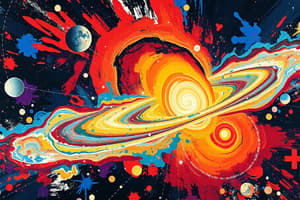Podcast
Questions and Answers
How does Jupiter's Great Red Spot compare to Earth in size?
How does Jupiter's Great Red Spot compare to Earth in size?
- Three times bigger
- Twice as big (correct)
- Half the size
- Same size
Which star is mentioned as being 2,000 times the diameter of the Sun?
Which star is mentioned as being 2,000 times the diameter of the Sun?
- Saturn
- Jupiter
- The Sun
- VY Canis Majoris (correct)
Approximately how wide is the Milky Way galaxy?
Approximately how wide is the Milky Way galaxy?
- 50 light-years
- 500,000 light-years
- 200,000 light-years (correct)
- 100 light-years
How does NGC 674, a spiral galaxy, compare in size to the Milky Way?
How does NGC 674, a spiral galaxy, compare in size to the Milky Way?
When did some galaxies start forming after the Big Bang?
When did some galaxies start forming after the Big Bang?
Flashcards are hidden until you start studying
Study Notes
- Earth and the moon can be 252,088 miles apart at their farthest point, a distance that can fit all planets in the solar system.
- Jupiter's Great Red Spot is about twice as big as Earth, while Saturn is nine times wider with rings containing fragments as large as mountains.
- The Sun is significantly larger than Earth, with the biggest known star, VY Canis Majoris, being 2,000 times the diameter of the Sun.
- The Milky Way galaxy is massive, with a diameter of about 100,000 light-years, equivalent to 621 quadrillion 371 trillion 192 billion 237 million 333,890 miles.
- NGC 674, a spiral galaxy, is twice as wide as the Milky Way, stretching over 200,000 light-years, containing millions or billions of stars and planets.
- The universe contains thousands of galaxies, each with millions or billions of stars and their own planets, some forming as early as 11 billion years ago after the Big Bang.
Studying That Suits You
Use AI to generate personalized quizzes and flashcards to suit your learning preferences.



